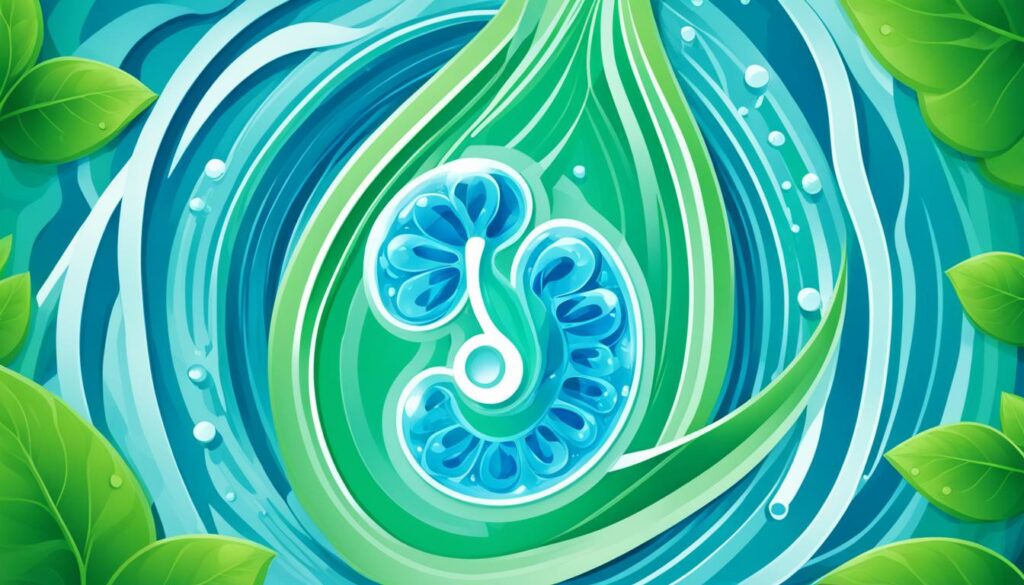The practice of water fasting, which restricts individuals to a liquid diet composed solely of water, raises significant concerns about kidney health during water fasting. This form of dietary intervention typically involves the consumption of two to three liters of water per day, usually for a week. While the body is resilient, the question remains: can water fasting damage your kidneys?
It is essential to consider the delicate balance of our body’s systems when exploring such an extreme form of calorie restriction. The kidneys are particularly sensitive to changes in hydration and metabolism, making maintaining kidney function while fasting a fine line to tread. Adequate medical supervision is critical, lest the pursuit of health becomes detrimental.
Key Takeaways
- Water fasting poses potential risks to kidney health and should be approached with caution.
- Kidney function may be compromised during extreme fasting due to metabolic shifts.
- Hydration levels are crucial in maintaining kidney function while fasting.
- Medical supervision is vital for individuals considering a water fast to prevent potential damage.
- The benefits of water fasting are not universally accepted and warrant further scientific scrutiny.
Exploring the Popularity of Water Fasting: Historical and Modern Perspective
Long before the advent of modern diet trends, water fasting stood as a testament to the human quest for wellness and spiritual growth. Rooted in the ascetic traditions of various cultures, this practice has transcended ages and survived as a vestige of humanity’s historical fascination with purification and self-discipline. Today, its resurgence in the sphere of health and wellness demonstrates the enduring allure of ancient practices, reimagined through the lens of contemporary health science.
Origins in Religion and Tradition: An Ancient Practice
The historical popularity of water fasting is intricately woven into the fabric of spiritual and religious observances across the globe. From the stringent fasts of medieval monks to the solemn rituals of indigenous healers, the practice was perceived both as a conduit for higher existential connections and a panacea for earthly ailments. Despite the sparse empirical evidence from these times, the continued reverence for fasting denotes an ingrained human belief in its restorative potential.
Transition to Health and Wellness Trends
In recent years, the narrative encompassing water fasting has shifted, spotlighting promising yet contentious benefits within health and wellness circles. Proponents extol its ability to recalibrate hormonal balance, modulate appetite, and mitigate chronic health conditions—a narrative echoing the past yet challenged by the scientific scrutiny of today. Amidst this modern tapestry, the health effects of prolonged water fasting and the potential risks of water fasting have emerged as focal points of contentious debate, casting a spotlight on the need for a judicious evaluation of benefits against potential harm.
While the echo of water fasting’s historical sanctity persists, modern advocates and skeptics alike grapple with parsing anecdotal claims from substantiated health effects, underscoring the complex interplay between traditional wisdom and contemporary scientific inquiry.
Understanding How Water Fasting Works in the Body
At the heart of the water fasting phenomenon lies a complex interplay of metabolic reactions, including the shift to ketosis, a metabolic state characterized by the breakdown of fats for energy in the absence of glucose. This process not only sparks a debate about the metabolic effects of water fasting but also raises questions about its impact on kidney health. As the body enters ketosis, typically within the first three days of fasting, fats are metabolized for energy, which can result in a range of physiological and metabolic changes.
Theoretically, this metabolic condition enhances fat burning and could have neuroprotective benefits due to lower free radical production. Equally important is the claim that water fasting can lead to improved insulin sensitivity and an increase in basal metabolic rate, suggesting possible advantages for certain bodily functions.
However, despite the noted benefits, the impact of water fasting on kidney health remains a topic of significant concern. The kidneys play a critical role in filtering and managing waste products in the body, and changes in metabolism during extended periods of fasting may exert undue stress on these vital organs, leading to health complications.
- Physiological impact: Extended periods of water fasting can lead to an increase in uric acid and creatinine levels.
- Kidney function: These metabolic byproducts may challenge the kidneys if not appropriately managed, potentially leading to kidney stones and decreased renal performance.
- Metabolic consequences: Long-term effects can include metabolic acidosis, where the body’s pH levels become imbalanced, adversely affecting overall well-being.
It is vital for individuals considering water fasting to weigh the potential benefits against these risks and to seek medical advice, particularly if they have underlying health conditions that could be exacerbated by such a regimen.
| Metabolic Effect | Impact on Kidney Health | Consideration for Fasting Duration |
|---|---|---|
| Ketosis | Potential increase in uric acid and creatinine | Short-term fasting less likely to cause harm |
| Insulin Sensitivity | Possible stress on kidney function | Requires careful monitoring of renal parameters |
| Basal Metabolic Rate | Risk of kidney stones and metabolic acidosis | Health benefits versus risks must be evaluated |
In summary, while there may be potential metabolic benefits associated with water fasting, such as weight loss, reduction in inflammatory proteins, and hormonal balance, one has to be continually mindful of the possible implications for kidney health. Ultimately, whether water fasting is a suitable practice for individuals should be determined in consultation with health care professionals.
Can Water Fasting Damage Your Kidneys?
The rise of water fasting as a health trend has brought with it questions about its impact on various aspects of health, particularly on the kidneys. This practice, while having historic roots in religious and cultural traditions, has gained contemporary popularity for its promises of health benefits. However, kidney damage prevention during water fasts is a concern that cannot be ignored. The body’s filtration system, the kidneys, may experience added strain as they work to manage and balance the increase of certain substances during a fasting state.
Short-Term Effects on Renal Function
Individuals who undertake water fasts might observe a short-term impact on their renal function. The concern arises when there is a noticeable increase in blood concentrations of uric acid and creatinine—substances associated with kidney health. Elevated levels of these byproducts are a warning sign, indicating that the kidneys are under stress due to the drastic change in dietary intake. While the body may cope with these changes temporarily, and some studies have shown a return to baseline kidney function following a regenerative diet post-fasting, the key to successful fasting without harm lies in avoiding the dangers of extreme water fasting by staying well-informed and cautious.
Long-Term Risks of Chronic Water Fasting
When it comes to long-term or chronic water fasting, the risks can become potentially more severe. Persistent deprivation of nutrients can lead to metabolic acidosis, a condition characterized by an imbalanced internal pH that has far-reaching consequences on overall health. Repeated cycles of water fasting can exert excessive pressure on the kidneys, potentially causing prolonged and irreversible damage. Furthermore, the chronic depletion of nutrients can trigger a struggle for balance within the body’s systems, which may result in increased oxidative stress and a negative impact on renal function.
In consideration of these facts, here is a comparative analysis of the risks associated with short-term and long-term water fasting on kidney health:
| Duration of Water Fasting | Short-Term Effects | Long-Term Risks |
|---|---|---|
| Short-Term (Days) | Increased uric acid and creatinine levels; potential temporary decreases in kidney function | Not typically observed |
| Long-Term / Chronic (Weeks or Months) | Potentially reversible with adequate post-fast nutrition | Metabolic acidosis, oxidative stress, and irreversible kidney damage |
In conclusion, while the body possesses a remarkable ability to adapt and restore itself, extremes such as water fasting must be approached with caution to prevent kidney issues. Health practices should always be balanced and carefully considered to protect against the dangers of extreme water fasting for both short-term and long-term wellness.
Potential Health Benefits Attributed to Water Fasting
The exploration of water fasting has yielded a spectrum of purported health benefits. This practice, while needing further scientific corroboration, has been linked with several positive physiological changes. Among the health benefits of water fasting, some of the most frequently cited include the modulation of hormonal balance, a recalibration of the brain’s hunger control centers, and a significant decrease in reduced inflammatory proteins.
Moreover, followers of water fasts often report improved insulin sensitivity, which is an enticing prospect for individuals looking to manage their blood sugar levels and improve metabolic health. The connection between this austere regimen and potential health improvements, however, requires a critical lens to sift anecdotal evidence from empirical studies.

In light of the need for empirical evidences, a comparative summary of noted health improvements observed from water fasting is presented below:
| Claimed Benefit | Supportive Evidence | Areas Requiring Further Study |
|---|---|---|
| Hormonal Regulation | Modulation of insulin and cortisol levels | Long-term hormone balance stability |
| Reduction of Inflammatory Proteins | Lower levels of C-reactive protein reported | Impact on chronic inflammatory diseases |
| Weight Loss | Initial decrease in body weight | Long-term weight management effectiveness |
| Improved Insulin Sensitivity | Short-term improvements in blood sugar control | Long-term effects on diabetes risk reduction |
| Enhanced Intestinal Immunity | Increased beneficial short-chain fatty acid production | Overall impact on gut health and immunity |
As evidenced by the table, water fasting’s role in potential wellness gains is notable. Still, each benefit carries the stipulation of uncertainty that only robust scientific inquiry can dispel. In consideration of this, individuals considering water fasting do so with mindfulness towards the current scope of research and under professional guidance, ever attentive to the health benefits of water fasting without overlooking the need for comprehensive validation.
Assessing the Dangers of Extreme Water Fasting
As the trend of extreme water fasting gains momentum, it’s vital to spotlight the extreme water fasting dangers associated with this practice. Designed as an intense form of calorie restriction, this diet merits serious consideration of its potential risks to human health, specifically in relation to kidney function and cardiovascular stability.
The allure of water fasting as a quick fix for weight loss and detoxification is contrasted by the alarming reality of its repercussions. Below, we dissect the two major concerns that must be acknowledged before one indulges in prolonged periods of water fasting: the impact on kidney health and the potential for serious cardiovascular complications.
Impact of Prolonged Fasting on Kidney Health
Proponents of extended water fasts often highlight the body’s ability to shift into survival mode, but what often goes understated are the prolonged water fasting risks, especially concerning kidney health. Our kidneys require a balance of electrolytes and hydration to function optimally. During water fasting, when intake of anything except water is drastically reduced, the kidneys can face significant strain.
- A rise in uric acid and creatinine levels indicating increased kidney stress
- A heightened risk of kidney stones due to changes in urine acidity
- Potential for long-term damage if water fasting becomes chronic
It is essential to consider the immediate and cumulative impact of water fasting on these critical organs before undertaking such a dietary challenge.
Electrolyte Imbalance and Risk to the Cardiovascular System
Electrolyte balance is a cornerstone of overall wellness and cardiac health. With water fasting, individuals risk unsettling this delicate equilibrium, potentially leading to severe cardiovascular risks during fasting. Electrolytes such as potassium, sodium, and magnesium are crucial for heart function, and their levels can become dangerously low during water-only diets.
- Decreased electrolyte levels can precipitate cardiac arrhythmias, a perilous cardiovascular event
- Extended fasting without nutrient intake may lead to impaired heart muscle function
- Repeated water fasting cycles can lower metabolism, leading to weight rebound and associated cardiovascular strain
Conscious acknowledgment of these health implications is critical, urging caution and informed decision-making among those considering extreme water fasting as a health strategy.
In sum, water fasting is not a practice to be adopted lightly due to its potential adverse effects on kidney and cardiovascular health. It demands thorough understanding and prudent consideration, exercised in tandem with the guidance of healthcare professionals who can provide tailored advice for individual circumstances.
Healthy Fasting Practices for Kidney Safety and Wellbeing
In the pursuit of health through fasting, safeguarding kidney function is paramount. To this end, healthy fasting practices for kidney safety entail not only a measured approach to fasting but also specific dietary considerations. By focusing on hydration and electrolyte balance, and seeking personalized advice from healthcare professionals, individuals can better navigate fasting regimens while maintaining their renal health.
Maintaining Hydration and Balancing Electrolytes
Maintaining kidney function while fasting is critically dependent on proper hydration. A key component of healthy fasting is ensuring a steady intake of water to avoid dehydration—an issue that places undue stress on the kidneys and can lead to complications such as kidney stones or impaired renal function.
Beyond staying hydrated, a balance of electrolytes is essential. Electrolytes like sodium, potassium, and magnesium are vital for many bodily functions, including maintaining fluid balance and supporting nerve and muscle function. Consuming electrolyte-rich beverages or supplements can help sustain these levels, even when your food intake is reduced.
- Drinking water regularly throughout the day, not just in response to thirst
- Incorporating beverages with added electrolytes if necessary, especially in hot climates or during physical activity
- Avoiding overhydration, which can also lead to imbalances and health complications

Consulting with Healthcare Providers for Personalized Fasting Plans
When it comes to fasting, one size does not fit all. People with comorbid conditions like diabetes or hypertension, or specific concerns like chronic kidney disease, must exercise additional caution. Healthcare providers can offer personalized guidance that considers individual health profiles and lifestyle factors, thus ensuring safe fasting practices.
For those already experiencing kidney issues, fasting may necessitate modifications or even be discouraged, depending on the severity of the condition. Regular consultations with a healthcare provider can help monitor kidney function and make any necessary adjustments to the fasting regimen, emphasizing kidney safety throughout the fasting period.
- Getting a pre-fasting medical evaluation to assess kidney health and function
- Following a healthcare provider’s recommendations on fasting duration and frequency
- Discussing potential dietary supplements or medications that might be needed during the fast
- Planning for the breaking of the fast with kidney-friendly foods that replenish nutrients without overburdening the kidneys
Incorporating healthy fasting practices for kidney safety is not only about avoiding harm—it may also unlock fasting’s potential benefits when done correctly. While the practices discussed herein serve as a framework, it is through personalized planning and ongoing health management that individuals can fast with confidence, knowing they are caring for their kidney health and overall wellbeing.
Conclusion
The distillation of knowledge regarding kidney health during water fasting yields a narrative of caution and circumspection. Historical and modern explorations into the realms of health and spirituality have imbued water fasting with an alluring sheen of benefits, from weight loss to improved metabolic health. Despite this, the underlying truth remains steadfast: maintaining kidney function while fasting demands an attentive and informed approach, underpinned by medical consultation and conscientious planning.
As we’ve navigated the potential benefits and the myriad of risks, the intermittent fasting health effects reveal a dichotomy—a balance of possible advantage against the backdrop of considerable peril. The kidneys, those vigilant sentinels of our internal milieu, may bear the unwanted brunt of an extreme fasting regime. Their prescient care is tantamount to ensuring not just the efficacy but also the safety of a fasting protocol.
In the quest for vitality and longevity, strategies for maintaining kidney function while fasting must be tailored and precise. Personalized fasting plans, developed in concert with healthcare professionals, are the linchpin for a beneficial fasting experience. It is only with this blend of personalization, vigilance, and scientific understanding that one can truly navigate the meticulous journey of fasting, ensuring the safeguarding of kidney health while potentially reaping the promised fasting health effects.




